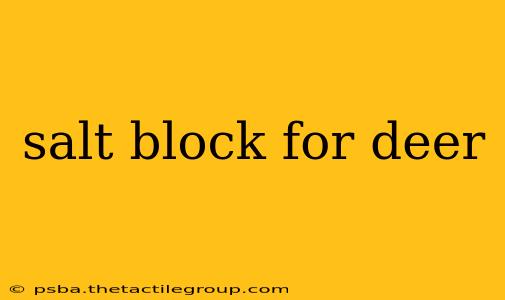Salt is a crucial mineral for deer, playing a vital role in their overall health and well-being. Providing a salt lick, often in the form of a salt block, can significantly benefit deer populations on your property, attracting them and improving their health. This comprehensive guide will delve into the various aspects of using salt blocks for deer, from choosing the right type to optimal placement strategies.
Why Use Salt Blocks for Deer?
Deer require sodium for various bodily functions, including muscle contraction, nerve impulse transmission, and fluid balance. Natural sources of sodium are often limited, especially in certain environments. Supplementing their diet with salt blocks ensures they receive the necessary sodium, leading to several positive outcomes:
- Improved Health: Adequate sodium intake boosts their immune system, improves digestion, and contributes to overall vitality. Healthy deer are more resistant to diseases and parasites.
- Increased Antler Growth: Sodium is critical for antler development in bucks. Providing a consistent salt source can lead to larger and healthier antlers.
- Attracting Deer: Salt blocks act as a natural attractant, drawing deer to a specific location. This can be advantageous for hunters looking to establish a hunting area or for landowners wanting to monitor deer populations.
- Improved Reproduction: Healthy females are more likely to produce strong, viable offspring. Providing adequate sodium contributes to improved reproductive success rates.
Types of Salt Blocks for Deer
Not all salt blocks are created equal. Understanding the different types available is crucial for selecting the best option for your needs:
1. White Salt Blocks:
These are the most common and typically the least expensive. They primarily consist of sodium chloride. While effective, they may not provide a complete mineral profile.
2. Mineral Blocks:
These blocks contain additional minerals beyond sodium chloride, such as phosphorus, calcium, magnesium, and zinc. They offer a more comprehensive nutritional supplement, benefiting deer health more broadly. These are generally preferred by wildlife experts.
3. Loose Salt:
While not a block, loose salt can be an effective and cost-efficient alternative, especially when scattering it strategically. However, it can be less efficient as it's susceptible to rain and can be easily dispersed by wind.
Placement and Management of Salt Blocks
The placement of your salt block is key to its effectiveness. Consider these factors:
- Location: Choose a relatively sheltered area, away from direct sunlight and heavy rain. A slight incline can help prevent water accumulation.
- Accessibility: Ensure the salt block is easily accessible to deer, but not too close to human activity that might disturb them.
- Multiple Blocks: Distributing multiple salt blocks across your property is often more beneficial, particularly in larger areas. This ensures that all deer have access to a salt source.
- Monitoring: Regularly check your salt blocks to monitor usage and replenish them as needed. A depleted block indicates high usage and the need for a replacement.
Frequently Asked Questions (FAQs)
Q: When is the best time to put out salt blocks?
A: Salt blocks can be beneficial year-round, but they are especially important during the spring and fall when deer's natural food sources are less nutrient-rich.
Q: Will too much salt harm deer?
A: While deer need sodium, excessive salt intake can be detrimental. The amount in a standard salt block is generally safe, but excessive consumption is unlikely due to the deer's natural instincts.
Q: Can I use table salt for deer?
A: No. Table salt is not recommended as it contains additives that can be harmful to deer. Always use salt blocks specifically formulated for wildlife.
Q: Are salt blocks legal everywhere?
A: Regulations regarding salt block usage can vary by region and state. Check local regulations before placing salt blocks on your property.
By following these guidelines, you can effectively utilize salt blocks to improve the health and well-being of deer on your land, contributing to a thriving wildlife ecosystem. Remember to prioritize responsible wildlife management and adhere to local regulations.

